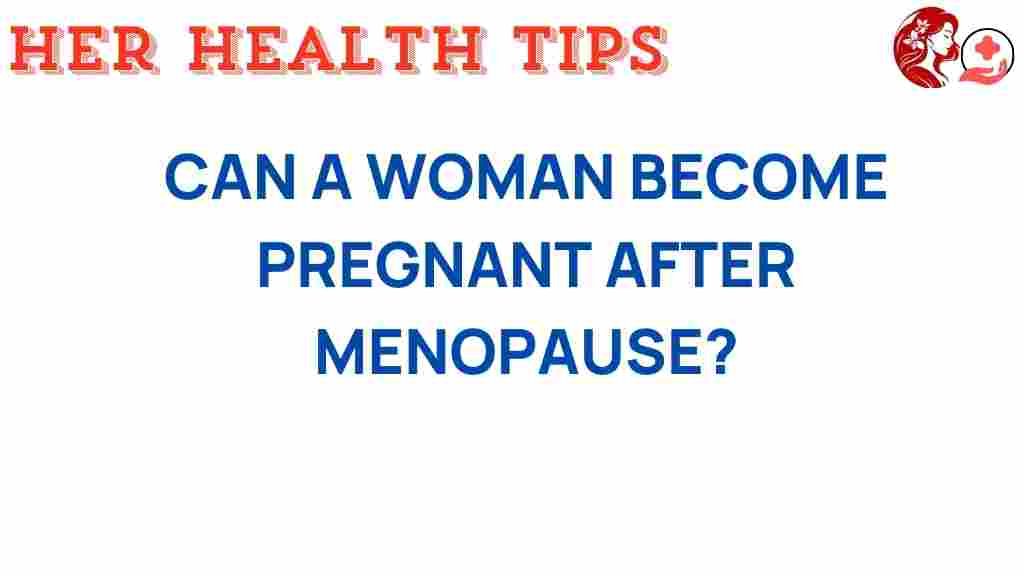Can Women Experience Pregnancy After Menopause?
The journey of women’s health is deeply intertwined with the stages of life, particularly when it comes to menopause and fertility. As women age, they experience significant hormonal changes that affect their reproductive health. This article will explore the surprising truth about whether women can experience pregnancy after menopause, shedding light on misconceptions and the role of assisted reproductive technology.
Understanding Menopause and Its Impact on Fertility
Menopause marks the end of a woman’s menstrual cycles and typically occurs between the ages of 45 and 55. It is a natural biological process that signals a decline in reproductive hormones, primarily estrogen and progesterone. Understanding menopause is essential, as it has a direct impact on fertility and the possibility of pregnancy.
- Hormonal Changes: During menopause, the ovaries stop releasing eggs, leading to a significant decrease in hormone levels.
- Age-Related Fertility: Fertility naturally declines with age, and by the time menopause occurs, women have a very limited number of viable eggs.
- Reproductive Health: After menopause, the likelihood of conceiving naturally is extremely low due to the absence of ovulation.
Can Women Get Pregnant After Menopause?
The straightforward answer is that natural pregnancy after menopause is not possible. Once a woman has gone through menopause, the body no longer produces eggs, which are essential for conception. However, it is crucial to understand the nuances surrounding this topic.
Assisted Reproductive Technology (ART)
While natural conception is not an option post-menopause, assisted reproductive technology (ART) provides an alternative for women wishing to experience pregnancy after this life stage. ART includes various procedures that assist with the conception process.
- In Vitro Fertilization (IVF): This method involves retrieving eggs from a donor or using previously frozen eggs, fertilizing them in a lab, and implanting the embryos into the uterus.
- Donor Eggs: Many women post-menopause opt for using donor eggs, which can be fertilized and implanted.
- Gestational Carriers: In some cases, a woman may choose to use a gestational carrier to carry the pregnancy if her reproductive system is not viable.
Misconceptions About Pregnancy After Menopause
There are several misconceptions regarding pregnancy after menopause that can lead to confusion and misinformation. Here are some common myths:
- Myth 1: All women can get pregnant naturally after menopause.
- Myth 2: Hormone replacement therapy (HRT) can restore fertility.
- Myth 3: Pregnancy after menopause is safe and without risks.
Understanding these misconceptions is crucial for women’s health and informed decision-making regarding reproductive health.
Factors to Consider When Considering Pregnancy After Menopause
If you are contemplating the possibility of pregnancy after menopause, several factors come into play:
- Age: The older a woman is, the higher the risks associated with pregnancy, such as gestational diabetes and hypertension.
- Health Status: Overall health, including pre-existing conditions, can influence the decision to pursue pregnancy.
- Support System: Having a strong support system can be beneficial for women considering this path.
Steps to Take If Considering Pregnancy Post-Menopause
Here’s a step-by-step guide for women considering this journey:
- Consult with a Healthcare Provider:
Schedule an appointment with a reproductive specialist to discuss your options, health status, and the feasibility of pregnancy through ART.
- Assess Your Health:
Undergo necessary health assessments to ensure you are fit for pregnancy and understand the risks involved.
- Explore ART Options:
Discuss various ART methods with your doctor, including the use of donor eggs or surrogacy.
- Make an Informed Decision:
Consider the emotional, physical, and financial implications of pursuing pregnancy after menopause.
Challenges and Troubleshooting Tips
Pregnancy after menopause can come with its own set of challenges. Here are some troubleshooting tips to consider:
- Emotional Support: Seek counseling or join support groups to navigate the emotional complexities of pregnancy after menopause.
- Financial Planning: ART procedures can be expensive; ensure you have a financial plan in place.
- Stay Informed: Keep abreast of the latest research and advances in reproductive health and ART technologies.
Conclusion
In conclusion, while natural pregnancy after menopause is not possible, advancements in assisted reproductive technology offer hope for women who wish to experience pregnancy later in life. Understanding the hormonal changes that accompany menopause and the options available can empower women to make informed decisions about their reproductive health.
It is essential to dispel the misconceptions surrounding this topic and to approach the possibility of pregnancy after menopause with caution, clarity, and comprehensive support. By taking the necessary steps and considering all factors involved, women can navigate this complex journey with confidence.
For more information on reproductive health and menopause, visit this resource. Additionally, if you’re looking to connect with others who share similar experiences, check out this community.
This article is in the category Reproductive and created by HerHealthTips Team
